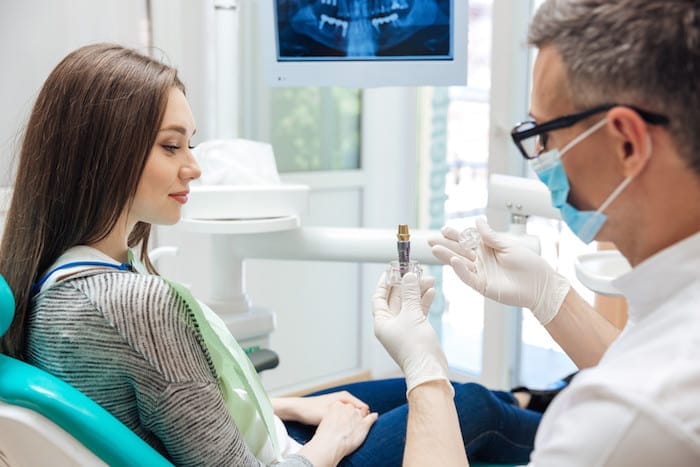Most of us understand the fundamentals of oral health. We know it’s important to brush our teeth every day and avoid substances like chewing tobacco. But unfortunately, there are many misconceptions about oral health that set people up for bad long-term outcomes.
What are these common misconceptions? What makes them so wrong? And what steps can you take to maximize your own oral health?
The Biggest Misconceptions About Oral Health
These are some of the biggest misconceptions about oral health that people still believe.
1. Once your teeth are gone, they’re gone. Dentists have a good point in warning you that you only have one set of adult teeth. If you get cavities, or if you need a tooth pulled, your body isn’t going to naturally grow a new one. However, if and when you begin to lose teeth, you should know that there are plenty of reasonable options for restoring the look and functionality of your teeth. Dental implants in Minneapolis are a great example of this; after a relatively uncomplicated surgery, you’ll have a strong and permanent metal post supporting an artificial tooth that looks and works like a normal tooth. A dental implant may not grow directly from your body, but it’s functionally almost identical.
2. Sugar causes tooth decay. You’ve likely heard the advice to stay away from sugary foods if you want to avoid cavities. While this advice is good, it leads to a misconception in the public that sugar causes tooth decay. Instead, sugar promotes the growth and spread of bacteria in your mouth. These bacteria then produce acid as a byproduct, and the acid is what causes tooth decay. Keeping your teeth free of sugar minimizes the propagation of this bacteria, and brushing regularly disturbs any active bacteria colonies that may have formed.
3. It’s normal for gums to bleed. When you brush or floss your teeth, do your gums bleed? Some people believe this is normal, but if you notice any bleeding, you should talk to your dentist about it. Bleeding could be a sign of developing gum disease.
4. Harder brushing is more effective. It’s tempting to think that brushing harder is somehow more effective. After all, scrubbing a pan more vigorously can remove stuck food more effectively than scrubbing it gently. However, brushing your teeth harder isn’t necessarily more effective; in fact, because it can cause gum erosion and cause premature enamel wear, hard brushing typically does more harm than good.
5. Soft-bristled brushes are for kids. On a related note, it’s possible to find many different types of toothbrushes in the store, with bristles that range from soft to hard. Some people believe that soft-bristled toothbrushes are for children, but most dentists recommend them for all people brushing their teeth, regardless of age.
6. Flossing is only necessary when food is stuck between your teeth. If there’s nothing stuck between your teeth, there’s no reason to floss, right? Wrong. Most of us immediately turn to floss after eating certain types of food, like corn on the cob, but regardless of your diet, it’s important to floss regularly. Even if you don’t feel them, you accumulate tiny food particles between your teeth throughout the day. Flossing is the only way to reliably get rid of them.
7. Chewing gum is always good for your teeth. There is some evidence that certain types of chewing gum are good for your oral health. Sugarless gum, consumed in moderation, can stimulate saliva production, help you remove food particles, and more. But that doesn’t mean that all types of gum are equally effective or that chewing gum is always a good thing; always read the label and avoid products that contain sugar.
8. Appearance and health closely correlate. If someone has a big, white smile, it’s natural to think that they have healthy teeth. But appearance and health don’t always closely correlate. It’s possible to have stained or crooked teeth and still have good oral health. It’s also possible to have seemingly perfect teeth from an outsider’s perspective, but suffer from cavities and other issues on the inside.
9. It’s fine to skip exams and cleanings if you have no issues. Some people only see the dentist when they have a problem. But this is a mistake. It’s important to go to regular exams and cleanings so you can keep your teeth healthy and polished – and detect small issues before they spiral into bigger ones.
10. Sensitivity is a sign of enamel loss. There’s also a public misconception that tooth sensitivity is a sign of enamel loss. In reality, tooth sensitivity can be a result of any number of root causes. If you’re experiencing sensitivity, talk to your dentist about the potential reasons why.
Learning From the Source
Were you surprised to learn about any of these common misconceptions? Did you learn something new about oral health today? That’s fantastic. But you’re not going to learn everything necessary about your oral health from a single article online.
That’s one reason it’s important to go to the dentist regularly, so they can help you understand the specific issues affecting your oral health and the habits and strategies that can keep you and your teeth healthy for the long run. Always trust your oral healthcare providers and follow their instructions as best you can.
Throughout the year, our writers feature fresh, in-depth, and relevant information for our audience of 40,000+ healthcare leaders and professionals. As a healthcare business publication, we cover and cherish our relationship with the entire health care industry including administrators, nurses, physicians, physical therapists, pharmacists, and more. We cover a broad spectrum from hospitals to medical offices to outpatient services to eye surgery centers to university settings. We focus on rehabilitation, nursing homes, home care, hospice as well as men’s health, women’s heath, and pediatrics.








